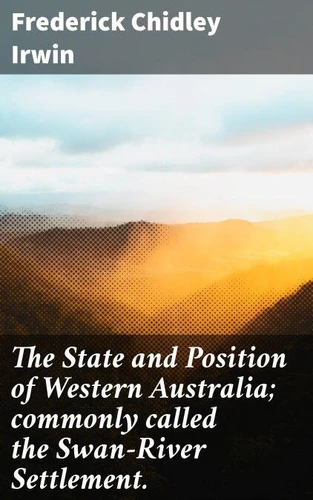The State and Position of Western Australia; commonly called the Swan-River Settlement.. An In-Depth Look at Swan River Colony's Beginnings
Par :Formats :
Disponible dans votre compte client Decitre ou Furet du Nord dès validation de votre commande. Le format ePub est :
- Compatible avec une lecture sur My Vivlio (smartphone, tablette, ordinateur)
- Compatible avec une lecture sur liseuses Vivlio
- Pour les liseuses autres que Vivlio, vous devez utiliser le logiciel Adobe Digital Edition. Non compatible avec la lecture sur les liseuses Kindle, Remarkable et Sony
 , qui est-ce ?
, qui est-ce ?Notre partenaire de plateforme de lecture numérique où vous retrouverez l'ensemble de vos ebooks gratuitement
Pour en savoir plus sur nos ebooks, consultez notre aide en ligne ici
- Nombre de pages118
- FormatePub
- ISBN406-633--808877-2
- EAN4066338088772
- Date de parution09/11/2021
- Protection num.Digital Watermarking
- Taille877 Ko
- Infos supplémentairesepub
- ÉditeurGOOD PRESS
Résumé
In "The State and Position of Western Australia; commonly called the Swan-River Settlement, " Frederick Chidley Irwin presents a comprehensive examination of the socio-political landscape of early Western Australia. The book adroitly blends empirical observations with passionate rhetorical flair, capturing the nascent settlement's developmental challenges and achievements during a pivotal time in colonial history.
Irwin's meticulous documentation of the region'Äôs demographic, economic, and environmental conditions is enriched by vivid descriptions, situating the Swan River Settlement within the broader context of British imperial expansion in the 19th century. Frederick Chidley Irwin, the first resident magistrate of Western Australia and a keen observer of its evolution, draws upon his extensive personal experience in the settlement.
His tenure in various administrative roles provided him with unique insights into the everyday lives of settlers and the complicated interactions between indigenous populations and European colonizers. Irwin's advocacy for the colony, coupled with his keen understanding of its potential, reflects his deep commitment to the region'Äôs advancement and sustainability. This book is an essential resource for historians, sociologists, and anyone interested in Australian history, offering a blend of personal narrative and factual analysis.
Irwin's insights provide a foundation for understanding the complexities of colonial settlements and their place in the broader tapestry of Australia'Äôs past. Highly recommended for those seeking to grasp the early dynamics of Western Australia.
Irwin's meticulous documentation of the region'Äôs demographic, economic, and environmental conditions is enriched by vivid descriptions, situating the Swan River Settlement within the broader context of British imperial expansion in the 19th century. Frederick Chidley Irwin, the first resident magistrate of Western Australia and a keen observer of its evolution, draws upon his extensive personal experience in the settlement.
His tenure in various administrative roles provided him with unique insights into the everyday lives of settlers and the complicated interactions between indigenous populations and European colonizers. Irwin's advocacy for the colony, coupled with his keen understanding of its potential, reflects his deep commitment to the region'Äôs advancement and sustainability. This book is an essential resource for historians, sociologists, and anyone interested in Australian history, offering a blend of personal narrative and factual analysis.
Irwin's insights provide a foundation for understanding the complexities of colonial settlements and their place in the broader tapestry of Australia'Äôs past. Highly recommended for those seeking to grasp the early dynamics of Western Australia.
In "The State and Position of Western Australia; commonly called the Swan-River Settlement, " Frederick Chidley Irwin presents a comprehensive examination of the socio-political landscape of early Western Australia. The book adroitly blends empirical observations with passionate rhetorical flair, capturing the nascent settlement's developmental challenges and achievements during a pivotal time in colonial history.
Irwin's meticulous documentation of the region'Äôs demographic, economic, and environmental conditions is enriched by vivid descriptions, situating the Swan River Settlement within the broader context of British imperial expansion in the 19th century. Frederick Chidley Irwin, the first resident magistrate of Western Australia and a keen observer of its evolution, draws upon his extensive personal experience in the settlement.
His tenure in various administrative roles provided him with unique insights into the everyday lives of settlers and the complicated interactions between indigenous populations and European colonizers. Irwin's advocacy for the colony, coupled with his keen understanding of its potential, reflects his deep commitment to the region'Äôs advancement and sustainability. This book is an essential resource for historians, sociologists, and anyone interested in Australian history, offering a blend of personal narrative and factual analysis.
Irwin's insights provide a foundation for understanding the complexities of colonial settlements and their place in the broader tapestry of Australia'Äôs past. Highly recommended for those seeking to grasp the early dynamics of Western Australia.
Irwin's meticulous documentation of the region'Äôs demographic, economic, and environmental conditions is enriched by vivid descriptions, situating the Swan River Settlement within the broader context of British imperial expansion in the 19th century. Frederick Chidley Irwin, the first resident magistrate of Western Australia and a keen observer of its evolution, draws upon his extensive personal experience in the settlement.
His tenure in various administrative roles provided him with unique insights into the everyday lives of settlers and the complicated interactions between indigenous populations and European colonizers. Irwin's advocacy for the colony, coupled with his keen understanding of its potential, reflects his deep commitment to the region'Äôs advancement and sustainability. This book is an essential resource for historians, sociologists, and anyone interested in Australian history, offering a blend of personal narrative and factual analysis.
Irwin's insights provide a foundation for understanding the complexities of colonial settlements and their place in the broader tapestry of Australia'Äôs past. Highly recommended for those seeking to grasp the early dynamics of Western Australia.



